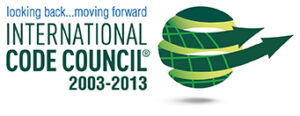
International Code Council Marks Another 10 Year Milestone
![]() Commitment to Members, Strategic Partners and Code Development
Commitment to Members, Strategic Partners and Code Development
 Ten years ago, if a nationwide retailer or manufacturer wanted to build a new facility, the code requirements for the same structure would have been different in the East, Midwest, South or West. Home builders, architects, engineers, designers, and contractors faced the same obstacles, a patchwork of building safety regulations. And career opportunities for code officials and building safety professionals were also limited by regional barriers.
Ten years ago, if a nationwide retailer or manufacturer wanted to build a new facility, the code requirements for the same structure would have been different in the East, Midwest, South or West. Home builders, architects, engineers, designers, and contractors faced the same obstacles, a patchwork of building safety regulations. And career opportunities for code officials and building safety professionals were also limited by regional barriers.
That all changed on Feb. 1, 2003, when three regional code organizations—Building Officials and Code Administrators, International Conference of Building Officials and Southern Building Code Congress International—began operating as one consolidated association: the International Code Council.
The movement to develop a single set of comprehensive, coordinated model construction codes for use throughout the United States and globally began in 1994.
“Bobby J. Fowler, the first chairman of the ICC Board of Directors, led the charge to consolidate the model code industry,” said Ronald Piester, President of the International Code Council Board. “He motivated BOCA, ICBO and SBCCI to look beyond regional interests and envision a single unified system of building safety for the entire country. As we pause to celebrate the 10th anniversary of our consolidated association, it is important to recognize the achievements of visionaries like Bob Fowler and other great leaders who embody the spirit of ICC.”
During the 2002 joint BOCA, ICBO, SBCCI annual conference in Fort Worth, Texas, members voted to combine services, products and operations into one association. And on Jan. 21, 2003, a joint resolution of consolidation was signed by BOCA Board Chairman Steve Shapiro, ICBO Chairman Roger Evans and SBCCI Board President William L. Duck during the International Builders Show in Las Vegas. The action reaffirmed the construction industry’s desire for a single model code system in the United States.
“For more than a century, the model code organizations, through the hard work of volunteers and staffs, have been serving our members and this nation to ensure safer communities,” then-SBCCI CEO and now ICC CEO Dominic Sims said in a memo to staff. “Now ICC is positioned to carry on this rich tradition for the next 100 years.”
The three model code organizations brought a combined 190 years of code development experience into one association to produce codes that are now used across the U.S. and around the globe. Prior to the ICC, the construction industry faced the challenge, and cost, of building to different codes in different areas of the country.
The International Codes combined the strengths of the regional codes without regional limitations, responding to the needs of the construction industry in a way that enhanced public safety. The ICC family of codes continues to enjoy strong support from code and fire officials, architects, engineers, builders and developers.
Support also comes from a host of industry associations including the American Gas Association, American Institute of Architects, National Association of Home Builders, National Multi Housing Council, and Building Owners and Managers Association. These organizations, ICC’s Founding Strategic Partners, have publicly stated their support for the I-Codes and consistently lend their resources to achieve code adoptions.
Today, the I-Codes are used at the state or local level in all 50 states and Washington, D.C., by federal agencies and referenced by architects, engineers and developers around the world.
The first I-Code published was the 1995 International Plumbing Code. By 2000, a complete family of I-Codes was available including the International Building, Residential, Fire, Energy Conservation, Mechanical, Fuel Gas, Property Maintenance and Zoning Codes. The ICC Performance Code for Buildings and Facilities joined the I-Code family in 2001. Two new codes debuted in 2003: the International Existing Building Code and the International Wildland-Urban Interface Code. In 2012 the I-Codes welcomed two new family members: the International Green Construction Code and the International Swimming Pool and Spa Code.
Looking forward, ICC is preparing to debut cdp ACCESS, the code development process of the future. The initiative will increase participation in ICC’s core function of code development and combine in-person and online participation. The concept of online participation in ICC’s Code Development Process dates back to 2001 where off-site voting on code changes was used by the three regional model code organizations. Testing of the online Governmental Consensus Vote is on track to occur in October in Atlantic City at the 2013 Public Comment Hearings, formerly called Final Action Hearings. The 2014 Cycle for the International Green Construction Code will be a binding Beta test for the entire cdp ACCESS process.
The International Code Council is a Member-focused association dedicated to helping the building safety community and construction industry provide safe and sustainable construction through the development of codes and standards used in the design, build and compliance process. Most U.S. communities and many global markets choose the International Codes.








